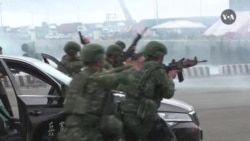Taiwan holds its largest ever military air raid drills amid threats from China.
Welcome to VOA Asia Weekly. I'm Chris Casquejo in Washington. That story is coming up, but first, making headlines:
Typhoon Gaemi swept through northern Taiwan on Thursday, killing three people and triggering flooding.
The typhoon, known as Carina in the Philippines, intensified monsoon rains in the country, causing the deaths of at least 22 people and displacing more than 600,000 others. Streets turned into rivers as heavy rain and floods forced the closure of government offices and schools in the capital city Manila.
Factories and businesses reopened in Bangladesh on Wednesday after the nationwide curfew was eased. Hospitals report that at least 147 people have been killed, and police have said they arrested around 3,000 people following last week’s deadly protests over government job quotas. Most of the country's internet has been restored, but social media remains restricted.
A small plane crashed while taking off in Kathmandu, Nepal Wednesday. The crash killed 18 people, but the captain survived. Nepal has been criticized for its poor air safety record. In January 2023, at least 72 people were killed in a crash involving Yeti Airlines.
North Korean trash balloons landed on South Korea's Presidential compound on Wednesday. The balloons did not contain dangerous materials, and no one was injured. But Wednesday’s incident raised concerns about the security of key South Korean facilities. North Korea has released more than 3,000 trash balloons to fly over South Korea since May.
The Philippines and China reached a “provisional arrangement” for a resupply mission to a beached Filipino naval ship in the South China Sea on Sunday. In the Philippines' annual State of the Union Address, President Ferdinand Marcos Junior said that the Philippines cannot compromise and will find a way to de-escalate tension in the South China Sea.
“The Philippines cannot yield, the Philippines cannot waver.”
A Chinese foreign ministry spokesperson said that Beijing hopes that Manila will keep its word.
Taiwan scaled back annual military exercises that started this week as Typhoon Gaemi bore down on the island. This year’s exercises included air raid drills to raise public awareness about how to respond to an attack from China and where to seek shelter. As VOA’s William Yang reports from Taipei, officials wanted the exercises to be as realistic as possible.
As sirens blared and traffic stopped, metro passengers were directed to underground shelters. The focus of Tuesday’s drill: simulating an incoming missile attack. Some gathered in underground parking lots like this one and squatted, bracing for impact.
Brian Chen was on his way to the gym when the drill began.
“Drills like this are important because if a serious disaster happens one day, Taiwanese people will be prepared.”
“Unlike drills in the past, which were more relaxed, the air raid drills in recent years have become more stringent. The scale of the exercises has expanded over the last two years.”
Taiwan is also conducting a series of “unscripted” military exercises aimed at enhancing troop’s capabilities to respond to real combat.
This year’s drills removed the largely performative elements of previous exercises. Analysts say the changes are aimed at boosting confidence in the military’s capabilities.
However, Taiwanese remain divided about how much confidence they have in the military.
“Taiwan is very united and a lot of us are reservists who have received very stringent training. I’m one of them.”
“From what I’ve heard or based on the experiences of my friends who have served in the military, I don’t have much confidence in the Taiwanese military’s combat capabilities.”
Some say the exercises are not enough and that Taiwan could do more to prepare for a potential conflict.
“The only way to prevent war is to be prepared for war. We can’t keep pretending that everything is peaceful.”
Huang says in light of the growing threats from China, Taiwan should make future military exercises even closer to real combat.
William Yang, VOA News, Taipei, Taiwan.
Visit voanews.com for the most up-to-date stories.
I’m Chris Casquejo.
Finally, baby turtles offer hope for an endangered species in Cambodia.
The Angkor Centre for Conservation of Biodiversity is carefully nurturing the first batch of black marsh turtle hatchlings in Cambodia. The plan is to rebuild the population of this endangered reptile after its parents were rescued from the black market.
Thanks for watching VOA Asia Weekly.











